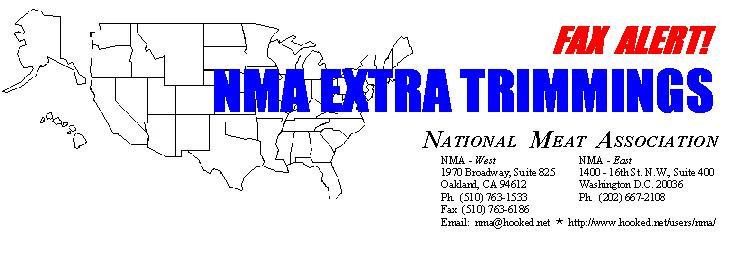

Fr: Rosemary Mucklow
NMA Executive Director
September 4, 1998
Re: Country of Origin Labeling and Mandatory Price Reporting
Congress has returned from its August recess, and it is in the process of finalizing the FY 1999 Agriculture Appropriations bill. As you know, the Senate version of this legislation would impose new country-of-origin labeling requirements and mandate price reporting for the livestock industry. Congress is scheduled to adjourn for the year on October 9, and the fate of these provisions will be decided within the next few weeks. It is imperative that the industry continue to voice its opposition to these provisions.
I urge every NMA member to contact your Representatives, Senators, or their staff in Washington as soon as possible. Since the decisions on this legislation will be made in a short time period, it is important that you make telephone contact rather than writing a letter. The easiest way to contact your Representatives and Senators is by calling the Capitol switchboard at 202/224-3121. Some brief talking points are attached to assist you with your conversations. You should follow up your call by faxing a letter reiterating your views. NMA can FAX you a list of the conferees, simply contact Ira Perez at (510) 763-1533.
Please let me know if you have any questions or need additional information.
Talking Points
Country-Of-Origin Labeling
��This provision would impose additional costs on the meat processing industry and the government. Segregating and separately labeling imported products will add significantly to processing costs. Violations of the new labeling provisions would be subject to criminal penalties. In order to insulate themselves from liability, processors and retailers are likely to require assurances of domestic origin, and this could impose new costs on producers. USDA has estimated that it would cost the government at least $60 million annually to enforce the amendment. Ultimately, these costs will be passed on to consumers.
��This amendment would not improve food safety. Meat products can be imported into the U.S. only if the Food Safety and Inspection Service (FSIS) has certified that the exporting nation has an inspection system that is equivalent to our system. Country-of-origin labeling will do nothing to increase food safety, and it is likely to give consumers a false sense of security. USDA has said that the amendment would not improve food safety and would "mislead and confuse consumers. . . ."
��This provision would violate U.S. international trade obligations. International trade agreements prohibit the use of country of origin labeling requirements as a means to protect domestic production. The clear intent of the amendment is to protect the domestic cattle and lamb industry. The primary supporter of this amendment, the National Cattlemen�s Beef Association, says the amendment is designed to address the "frustration among U.S. producers" that has been caused by increased competition. U.S. meat exports are increasing rapidly, and, ultimately, this provision could backfire by encouraging retaliatory measures by other nations. USDA recognizes that this could complicate trade negotiations, and the Department has stated that the amendment "puts the United States in an awkward position in the international arena. . . ."
Mandatory Price Reporting
��The vast majority of livestock sales are already reported voluntarily. A voluntary reporting system is already in place, and it captures nearly two-thirds of cattle sales and three-fourths of boxed beef sales.
� New reporting requirements would impose additional costs with no benefit to producers. Since most livestock and beef sales are reported voluntarily, producers have an accurate view of the marketplace. A blanket mandate to report all sales would do nothing to improve the situation, and would only create a new government bureaucracy to oversee the effort. This would undoubtedly impose additional costs throughout the supply chain.